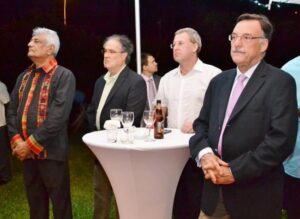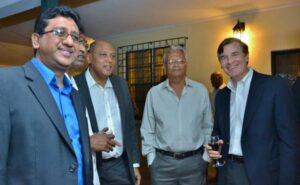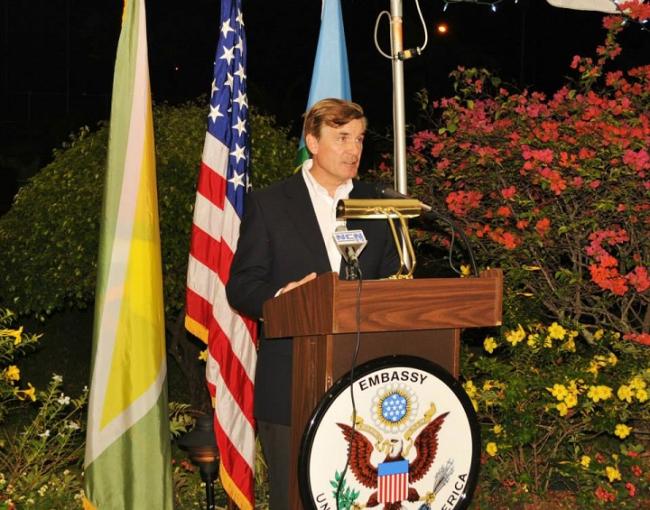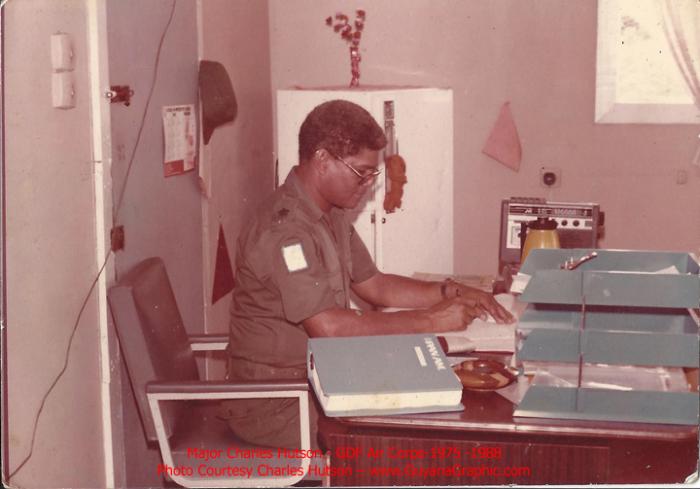
On Friday, May 2, 2014, United States Ambassador to Guyana D. Brent Hardt hosted a Reception for the Media in recognition of World Press Freedom Day. This year’s theme for World Press Freedom Day is “Media Freedom for a Better Future: Shaping the post-2015 Development Agenda.”
Ambassador Hardt honored several journalists and editors for their contribution to media in Guyana.
Remarks by Ambassador D. Brent Hardt on World Press Freedom Day
May 2, 2014
Government Representative,
Ministers,
Members of Parliament,
Members of the Diplomatic Corps,
Esteemed Members of the Media,
Specially Invited Guests,
Ladies and Gentlemen:

Mrs. Hardt and I are delighted to be in the presence of so many of our friends and colleagues from the media who are here with us this evening for what has become one of my favorite events of the year: a reception to honor the vital work carried on by the members of the media in Guyana on World Press Freedom Day.
Tomorrow, May 3rd, is the date when the world celebrates the fundamental principles of press freedom. The 2014 World Press Freedom Day theme established by the United Nations is: Media Freedom for a Better Future: Shaping the post-2015 Development Agenda. As UNESCO observed:
This day “serves as an occasion to inform citizens of violations of press freedom — a reminder that in dozens of countries around the world, publications are censored, fined, suspended and closed down, while journalists, editors and publishers are harassed, attacked, detained and even murdered. It is a date to encourage and develop initiatives in favor of press freedom, and to assess the state of press freedom worldwide. It serves as a reminder to governments of the need to respect their commitment to press freedom and is also a day of reflection among media professionals about issues of press freedom and professional ethics.
These are all vital issues for countries worldwide to take time out and reflect on the state of media freedom, why it is so important, and to consider what more can be done to strengthen it.
Let us first consider why media freedom is so important. At last year’s Washington Press Dinner, President Obama recognized the daunting responsibility the media have every day “to give people a voice and to hold leaders accountable.” The President follows a long line of American leaders, who have understood the intimate connection between the press and the success of democratic societies. President Thomas Jefferson observed that “Our liberty depends on the freedom of the press, and that cannot be limited without being lost.” He added that “a press that is free to investigate and criticize the government is absolutely essential in a nation that practices self-government.” Jefferson’s successor, James Madison added that, “popular government, without popular information, or the means of acquiring it, is but a prologue to a farce or a tragedy: or perhaps both.” And in more recent times, the great American journalist Walter Lippmann asserted presciently that “a free press is not a privilege, but an organic necessity in a great society.”
Of course, this is not to say that the press is perfect in every way. That great observer of America, Alexis de Tocqueville pointed out that “in order to enjoy the inestimable benefits that the liberty of the press ensures, it is necessary to submit to the inevitable evils that it creates.” Oscar Wilde, with a bit more sarcasm, observed: “In the old days, men had the rack. Now they have the press.” He also wryly wrote: “In America the President reigns for four years, and journalism governs for ever and ever.” And it was presidential candidate Adlai Stevenson who once observed: “An editor is one who separates the wheat from the chaff, and then prints the chaff.”
The fact is you all have a tough job. You have to try to pry information from people who may not want the information out, or you have to sift through information put forward quite eagerly, but whose primary purpose may be to distract or divert your focus. And at the end of the day, you have to tell a story – a rough draft of history — that people will find interesting and worthwhile to read.
These challenges remind me of a story about our 30th President, Calvin Coolidge, who was notoriously taciturn and with good reason was nicknamed “Silent Cal.” A journalist approached him one day and said, “You must talk to me President Coolidge. I made a bet today that I could get more than two words out of you.” Coolidge respectfully told her: “You lose.” So, as I said, being a journalist can sometimes be tough.
But journalism can also be rewarding. In Guyana’s newspapers and television this past year, we have seen many examples of journalists who have brought to public attention stories that needed to be told: stories of young girls enduring the slavery of trafficking in persons in remote mining areas and being rescued by courageous Guyanese women, only to find inadequate support and law enforcement follow through after their rescue; or stories of Guyanese members of the LGBT community facing violent assaults or other forms of discrimination; or stories that make comprehensible to people complex issues of money laundering or budget debates; or stories that highlight the decay in local communities in urgent need of effective, elected local governance.
That Guyana’s media is able to report on these and many other stories is why Reporters without Borders ranked Guyana a respectable 67thworldwide out of 180 countries its 2014 Press Freedom Index, a slight improvement from last year. In Freedom House rankings for 2014, Guyana was classified once again as “partly free.” These are positive signs for Guyana’s development, but certainly there is more that can be done to protect and expand freedom of the press and the free exchange of ideas and perspectives it makes possible.
Many of these issues were highlighted by the respected International Press Institute, which visited Guyana last year and, together with the Association of Caribbean Media Workers, issued a comprehensive assessment on the media situation in Guyana and other Caribbean countries. Despite higher rankings in the Caribbean than in Latin American, they observed, “all is not well for the Caribbean media.” Among the concerns they noted were that journalists in some countries “continue to practice self-censorship,” and that “state-owned media continue to serve as propaganda vehicles for the government in power rather than as providers of balanced informant to the public.”
Turning to Guyana in particular, the IPI focused attention on issues of broadcasting licenses, abuse of state media, the distribution of state advertising, direct intimidation of the press, freedom of information, and media standards.
When I first hosted this reception back in May 2012, I expressed my surprise in coming to Guyana and finding that, unlike all other Caribbean countries I had visited, Guyana alone had complete state monopoly of the radio. Where in other countries the radio with its ubiquitous call-in shows was a vital public forum, in Guyana there was no such counterpart. Two years later, it is certainly disappointing that radio in Guyana still falls short of offering an open public square for debate and discussion.
Instead, as the IPI report makes clear, “attempts to diversify the sector have been consistently stonewalled: a number of independent media outlets . . . have had their broadcast applications denied or ignored, in some cases for more than 20 years.” In May 2013, special rapporteurs from the UN, OAS, and OSCE on freedom of expression and opinion issued a joint statement on digital broadcasting rights in which they affirmed: “The process for allocating broadcasting licenses should be strictly regulated by law and be guided by clear, objective, transparent, and democratic criteria.” IPI concluded that these criteria “have not been observed in Guyana.” Indeed, their statement bears repeating especially this evening: “While IPI was previously aware of allegations that broadcast licenses have been unfairly distributed in Guyana, our visit revealed the full depth and gravity of this issue. It is unthinkable that the license applications of certain media have been delayed or ignored for nearly two decades. We call upon the newly constituted Broadcast Authority to immediately undertake a speedy and fair review of any outstanding license applications and to ensure that all applicants are subject to independent review.”
IPI’s Executive Director Bethel-McKenzie also pointed out that “it is highly unusual that a sitting president should also be his or her country’s information minister, and we urge Guyana to end this practice so as to reduce the likelihood of conflicts of interest in dealing with the media.” These are strong words and sound advice from media experts in the Caribbean region.
The second area of concern for the IPI was what it termed “abuse of state media” and the demeaning of what the government terms the “opposition press.” Despite Guyana’s vibrant private press, IPI notes that “state media continued to be a powerful force.” “Unfortunately,” they add, “the state media are widely viewed as propaganda vehicles for the government and appear to be frequently abused in order to attack the political opposition.” The United States shares IPI’s belief that state and public media “should represent the views of all political actors in a fair and balanced manner.”
IPI also raised an issue I have long found perplexing: the use of the term “opposition media” to describe any media institution that is not controlled by the government. This is indeed a demeaning term that fails to do justice to the vital role that an independent media must play in a modern, democratic society. The use of this appellation is also inaccurate. Anyone who reads or watches independent media in Guyana will see that there are letters to the editor supportive of the government, columns that advocate government positions, and generally balanced reporting on actions of government. By contrast, in the state-owned and state-run media, which should hold itself up to an even higher standard of balance by virtue of its being funded by taxpayers, one hardly ever sees a letter to the editor or a column supportive of the opposition or critical of the government. In fact, the public reads about instructions being passed by the government to state-run television criticizing staff for airing statements by an opposition party directly after the government’s position was presented, and indicating that such presentations were only to be aired late at night when viewership was lowest. Such censorship is not only wrong, but completely unnecessary for a government that is more than capable of defending and articulating its views on a fair playing field of public opinion. As the distinguished U.S. Supreme Court Justice Potter Stewart once observed: “Censorship reflects a society’s lack of confidence in itself.”
IPI’s report also highlighted that state advertising patterns in Guyana reveal “extreme inequalities” in the way the advertising is being distributed. Such inequalities, which ironically run counter to circulation numbers, are also contrary to Principle 13 of the Inter-American Declaration of principles on Freedom of Expression, which clearly state that “arbitrary and discriminatory placement of official advertising” with intent to punish or reward because of opinions they express threatens freedom of expression. To meet its international obligations, the Government of Guyana should therefore ensure that state advertising is distributed fairly and without regard for the editorial stance of a newspaper or television station.
Other key issues highlighted by IPI are also essential to a free and independent media and a strong democracy, and they are interrelated: freedom of information and investigative journalism, direct intimidation of the press, and training and media standards.
According to the International Press Institute, journalists in Guyana view the difficulty of obtaining information from the government as one of the primary obstacles to doing their job well. Guyana did take a positive step toward greater transparency in 2011 with the passage of the Access to Information Act, but there have unfortunately been delays in implementation. While the appointment of an Information Commissioner is welcome, IPI pointed out that, to be effective, transparent, and independent, this position should be adequately staffed and separated from the Office of the President in keeping with international standards.
IPI also expressed concern about what it termed “direct intimidation of the independent press” and ‘high levels of hostility and mistrust” between the government and journalists. In this regard, it called on journalists to “take a more critical approach to reporting” rather than “accepting the government’s account of events as given at a press conference.” So tonight I would encourage all of you to not be afraid to ask the tough follow-up question. For example, when a government official suggests that a foreign assistance program is providing assistance to political parties, ask those officials to back up their allegations. Don’t keep repeating the same unsupported allegations in follow-up reports, press for new information, investigate, and inform!
Good journalism, we all know, follows the two “P’s” – preparation and persistence. So be prepared. Always be reading, listening, watching. See what other media sources are saying, writing, and thinking. Be critical in your appraisal. Notice and analyze what makes a story or feature compelling to read. You need to keep knocking –politely — on dozens and dozens of doors until the right door opens.
The final element I mentioned was that of training and media standards. For the media to play its vital role in a democracy, it must be well-trained and hold itself to the highest professional standards. Press freedom is not just as an abstract policy, but a very practical skill that needs to be taught, nurtured and promoted. The Embassy has been pleased over many years to be able to contribute to media training in Guyana, and we welcome the support we have received from editors and the enthusiastic participation of reporters.
Most recently, Guyana’s own Denis Chabrol of Demerara Wavesparticipated in the State Department’s prestigious International Visitor Leadership Program, joining the likes of Speaker Raphael Trotman, Minister Robert Persaud, MP Khemraj Ramjattan, Justice Roxanne George, and Gordon Moseley as IVLP alumni. Denis’s program focused on new media and social networking tools and how new media can be used to promote transparency and accountability. Denis will shortly share with you some of his observations from the experience.
I am also pleased to announce that we are planning media workshops May 16 and 17 for entry level reporters and communications students. These workshops will address challenges in journalism, women in media, journalistic integrity, and sustainability of journalism. We will pick up where we left off from last year’s media training, which was done in conjunction with the Centre for Communication Studies at the University of Guyana. Please make sure to save these dates; we look forward to seeing you in two weeks.
As I come closer to the end of my diplomatic tenure in Guyana, I would like to take this opportunity to convey my personal thanks and appreciation for your efforts to inform the public and stimulate the public debate that is the lifeblood of democracy. I would also like to thank you for helping to bring to the public’s attention my Embassy’s diverse and dedicated efforts to forge vital new partnerships with the government and people of Guyana. I have always appreciated the interest you have shown in our work. The relationship between our countries and our people is dynamic and mutually beneficial, and both countries need you to tell that story fairly and accurately.
So again, please accept my heartfelt thanks. And enjoy this evening in your honor, which is very well deserved.







